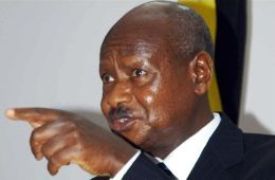LRA rebels will not face ICC – Uganda’s Museveni
March 11, 2008 (LONDON) — Ugandan President Yoweri Museveni said Tuesday that rebels due to stand trial at the International Criminal Court for rape, mutilation and murder will instead face justice in Uganda at the request of their victims.

Joseph Kony, the rebels’ leading official, and four other top leaders have been indicted by the International Criminal Court in The Hague, Netherlands, on atrocity charges.
The rebel army’s fighters are notorious for cutting off the tongues and lips of civilians and abducting thousands of children, turning the girls into sex slaves and the boys into fighters.
In an interview with the Associated Press in London, Museveni said communities that suffered at the hands of the Lord’s Resistance Army had requested that they face prosecution in Uganda.
He said rebels will be prosecuted under a system of traditional justice.
Other Ugandan officials had said that those charged with serious crimes would be dealt with by a special unit of Uganda’s High Court and that those accused of lesser crimes would be judged according to northern Uganda’s traditional justice system, known as Mato Put.
Mato Put, which is not part of Uganda’s formal legal system, is a style of mediation that involves a public apology from the offender, who must also give a payment set by local elders , often in cattle or sheep , to victims or their survivors. In return, victims agree to forgive the accused.
Some human rights groups condemn such punishment as too lenient.
Judges in The Hague have asked Uganda to specify how it expects the international court to proceed.
Museveni said rebels who had previously hidden in the Democratic Republic of Congo, including Kony, will face traditional justice.
“That is what we have agreed at the request of the local community. They have been mainly tormenting people in one area and it is that community which asked us to use traditional justice,” Museveni said.
“What we have agreed with our people is that they should face traditional justice, which is more compensatory than a retributive system,” he said.
He rejected suggestions that the international community will be concerned if the Lord’s Resistance Army leaders are not handed over to the International Criminal Court, saying other nations should respect the wishes of local communities.
“If that’s what the community wants, then why would we insist” on a trial in the Hague, Museveni asked.
On another matter, Museveni rejected criticism that he was too quick to praise the election victory declared for President Mwai Kibaki in neighboring Kenya after a questioned ballot Dec. 27. The dispute over opposition claims of vote fraud led to weeks of bloodshed that killed more than 1,000 people.
“Of course we were right, because this is an ordinary courtesy,” Museveni said. “The proper thing the opposition could have done would have been to go to court.”
Museveni said Uganda supported calls for a neutral judicial body to settle the electoral dispute.
Museveni, who was sworn in as president in 1986, said Uganda will not host any permanent United States military base as part of the new U.S. military command for Africa.
During his visit to Africa in February, President Bush said the U.S. had not decided if it needs a permanent headquarters in Africa, though it is expected to eventually establish a major new African base.
“It would be difficult for us to host a base for anybody,” Museveni said. “The only thing you can do is short-term cooperation … in case they are engaged in helping Africans.”
(AP)
